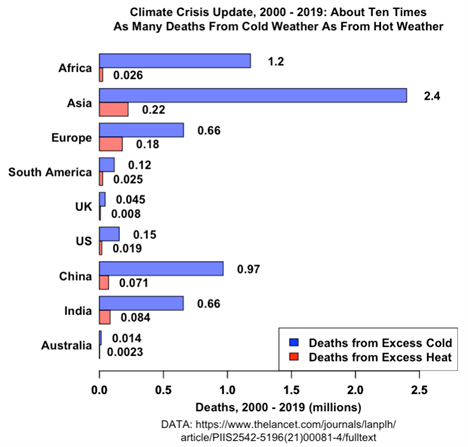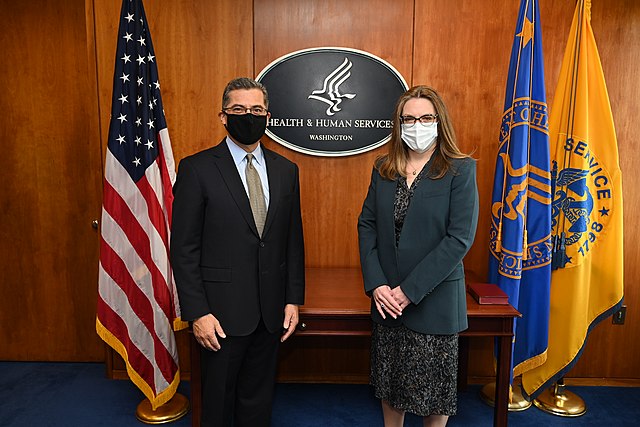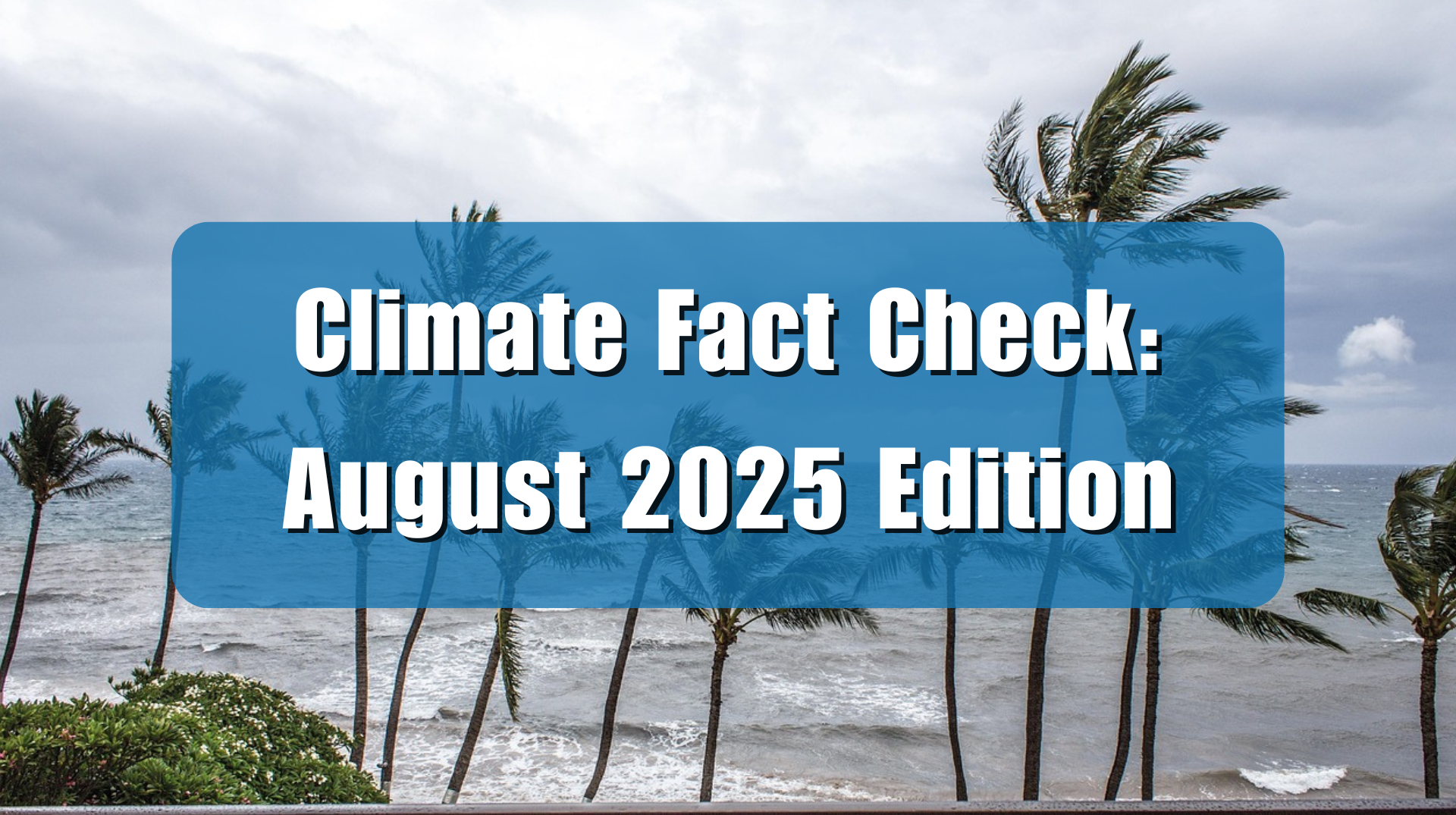In testimony before a U.S. House committee, Xavier Becerra, Secretary of Health and Human Services claimed climate change was harming human health and killing people. This is a false. Real world data shows as the Earth has modestly warmed, deaths related to non-optimum temperatures have declined substantially, and deaths from extreme weather have fallen even more. History and research prove it is cold, not heat that is the real climate threat to human health.
E&E News Daily covered hearings held by the House Committee on Education and Labor during which Sec. Becerra discussed the necessity of expending resources to create an Office of Climate Change and Health Equity (OCCHE) within HHS. Congress rejected the Biden administration’s $6 million budget request to fund OCCHE in fiscal 2022. Ignoring Congresses clear intent, Becerra created the office anyway, staffing it with employees assigned to other divisions at HHS.
When asked about the justification for the office by Rep. Glenn Grothman (R-WI), Becerra testified that communities across the United States, “are suffering ill health many times driven by the fact that the climate has exacerbated conditions,” continuing, “Climate had affected everything including our health.
“We have an office that tries to protect people’s health, and one of the ways we can do that also takes into account the effects of climate change,” said Becerra. “Congressman, people are dying.”
On the connection between climate change and human health, Becerra is simply wrong.
As explored in Climate Realism, here, here, and here, for example, deaths resulting from cold temperatures contribute to far more deaths each year than warmer temperatures; and, as the earth has warmed modestly, deaths associated with extreme temperatures have declined.
On July 1, 2021 The Lancet published what is arguably the largest study ever to examine excess mortality associated with temperature. The study’s authors, 68 scientists representing universities and research institutes in 33 countries spanning all regions of the world, came to two very clear conclusions: Cold temperatures contribute to far more deaths each year than warmer temperatures; and the number of deaths associated with extreme temperatures is falling.
The authors wrote, “[i]mportantly, cold-related death decreased 0.51 per cent from 2000 to 2019, while heat-related death increased 0.21 per cent, leading to a reduction in net mortality due to cold and hot temperatures.”
Because cold related deaths outnumber deaths tied to extreme heat by 10 to 1, the study found hundreds of thousands fewer people have died in response to non-optimum temperatures each year as the earth has warmed in recent decades. (See the figure below)

This study confirms what research previously published in The Lancet, the Southern Medical Journal, and other outlets, has consistently shown: Cold is the biggest temperature related killer, not heat, and as he earth warms the number of deaths related to extreme temperatures is falling dramatically.
Numerous studies also demonstrate that transmissible diseases like the flu and the coronavirus are far more prevalent and deadly during the late-fall, winter, and early spring, when the weather is cold and damp, rather than in the summer months when it is warm and dry. That is a reason the flu season runs from fall through early spring, and then peters out. Also colds, while not unheard of, are less common in the summer as well.
Chapter 7 of the Non-governmental International Panel on Climate Change’s report of Climate Change Reconsidered: Biological Impacts details the results of dozens of peer reviewed studies and reports showing premature deaths from illness and disease are far more prevalent during colder seasons and colder climate eras rather than during warmer seasons and warmer climate eras.
Becerra did shine the light on one factor possibly contributing to illness and death during the winter: High energy prices.
“People are dying in some of these communities because … they can’t afford to keep the heat on in their apartment,” said Becerra.
If this latter is true, that’s the fault of the Biden administration’s energy policies which have led to higher prices, not climate change or winter weather which is moderating. Indeed, as detailed in in The Heartland Institute’s recent report, titled “Biden Energy Policies Cost U.S. Households More Than $1,000 in 2021,” Biden’s policies have reduced U.S. oil and gas supplies and raised prices correspondingly. This, not global warming, is responsible for higher heating costs.
Official data from the IPCC and various U.S. government agencies presented in Climate at a Glance: Drought, Climate at a Glance: Floods, and Climate at a Glance: U.S. Heatwaves also show incidences of extreme weather have neither increased in frequency or severity. Data suggests some extreme weather trends have even moderated in recent decades. Since weather is not becoming more extreme, it is impossible for an increase in extreme weather events to be causing an increase in deaths, as Becerra’s testimony implied.
Indeed, data spanning 100 years of “global warming” back to 1920 presented in Climate Realism, here, for example, show deaths resulting from climate related events have fallen to a historic low, and now nearly approach zero.
Becerra’s claims about climate change causing more illness and death are untrue. When making these statements, Becerra was either ignorant of the facts, or he was lying. In either case, he presented no justification for creating the OCCHE within the HHS in the face of Congress’ decision not to fund it. Arguably, Becerra’s statements betrayed the fact that he is unfit to serve as HHS secretary. Why? Because he either lied to Congress under oath, or was unaware of readily available facts about health and climate change critical to his department making optimal decisions about where to allocate its scarce resources to best promote human health.
























Don’t forget – climate change causes cold as well as hot